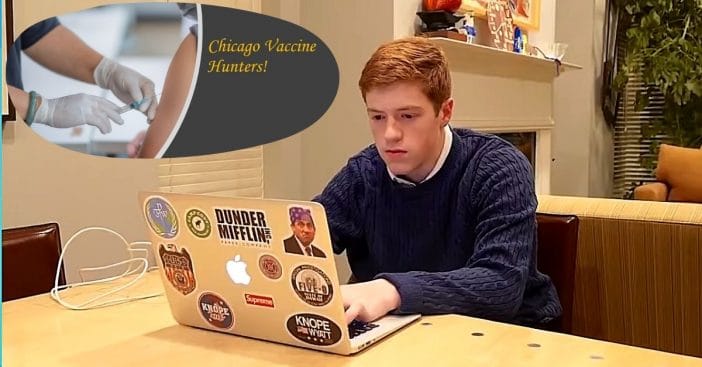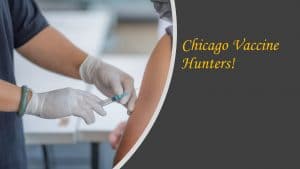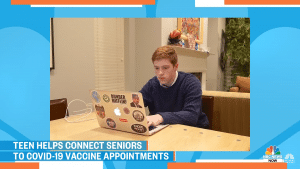
With the rollout of several new COVID-19 vaccines, recipients must secure appointments. Different areas are putting a priority on different members of the community such as first responders, senior citizens, and those with health risks. Seniors aged 65 and up are considered a high-risk group and Chicago teen Benjamin Kagan is making sure they can secure protection against the coronavirus.
Kagan is just 14 years old and has his eyes on a very mature, important prize: bringing order to chaos, and safety to the vulnerable. He also proved the perfect candidate for bridging the gap between some seniors and the technological restraints keeping them from securing a COVID-19 vaccine appointment. Learn more about his work here.
Benjamin Kagan identified a problem and tackled it
Nothing about Benjamin Kagan’s freshman year of high school has been particularly normal. He, his classmates, and everyone’s family must bunker down and exit the house carefully, ever mindful of the coronavirus. Near the end of 2020 and into 2021, announcements poured in heralding vaccines against COVID-19 and rollout commenced. During spring break, his grandparents in Florida required a vaccine but couldn’t get appointments. Using his own knowledge of today’s technology, Kagan remotely helped them from his home in Chicago. Thanks to him, the elderly couple secured appointments despite technology acting as a barrier.
RELATED: Steve Martin Shares Good News (And Bad News) About Getting The COVID-19 Vaccine
While Kagan did this for his own grandparents, other seniors around his state faced a very similar challenge. He learned the extent of this problem while watching the local news, TODAY reports. The particular story covered a Facebook group calling itself Chicago Vaccine Hunters, made up of Chicago residents dedicated to helping seniors overcome their unfamiliarity with technology to secure COVID-19 vaccination appointments. Confined by a broken ankle and quarantine, inspired by the desire to help, Kagan felt, “I thought, I could do this.”
Securing COVID-19 vaccination appointments

Quickly after joining the group, Benjamin Kagan found himself with a very full inbox, all messages imploring him to help this vulnerable population get an appointment. Kagan dove in and took an organized approach to this; if he was going to do this, he was going to be all-in. “I figured, OK, well, all these people need help and some of them aren’t good at using technology — that’s an issue that we face a lot with some of the older people in the group,” he explained. He created a Google form so he and another volunteer could see a person’s submission and work to get then a COVID-19 vaccination appointment. Kagan has since expanded his work by forming another Facebook group, Chicago Vaccine Hunters. After only a few weeks of operating, the page has some 50 volunteers helping his mission.
And with those 50-plus volunteers, they’ve helped over 250 people secure an appointment for their first shot. He’s even in correspondence with a nurse who informs him of appointment slots opening up and urges another round of seniors to come. Hundreds of people have Kagan to thank, as well as those in his environment who nurtured this spirit of giving. “One of the values that I’ve been raised with by parents and throughout school,” he explained, “is that when you see something that’s wrong, you stand up and try to fix it. So I saw that this system was wrong and incredibly screwed up. So I am doing my best to help fix it for those that need, to help them out.”

How long he’ll do that depends on federal, state, and local governments, because Kagan assured, “Until everyone in this country is vaccinated, or can easily access a vaccine by calling a pharmacy or going online, I’m going to continue doing this.”
Vaccine shortages coupled with extreme weather impacted some states’ ability to dispense vaccines. Additionally, some brands require extremely cold temperatures to store them in. Though the coronavirus has claimed lives from many different age groups and health backgrounds, the elderly and those with an underlying health condition are considered especially susceptible to the virus.
